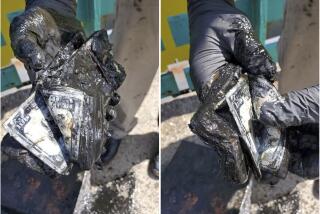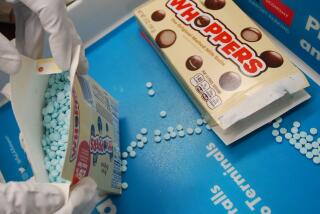Cold storage tips for hot cash
- Share via
MANY AMERICANS were aghast last week when an FBI court filing claimed that agents found cash totaling $90,000 in a congressman’s freezer. Expressions of disgust were swift, bipartisan ... and misguided. The truth is, with proper precautions, our currency can keep quite well in most late-model freezers.
Yes, at first glance, the crisper bin of a refrigerator would seem a more appropriate place to ensure the freshness of unmarked bills, no matter the denomination. And storage of such large sums of cash, even with today’s spacious side-by-side refrigeration systems, is an unorthodox practice.
When promotion of Nigerian business concerns leads to a glut of nonsequential bills, American homemakers have a grand tradition of preserving such windfalls at room temperature -- be it an interest-bearing checking account or a hollowed-out hardcover edition of a David Foster Wallace novel. Both options afford families valuable freezer space for more common perishables, such as ice cream.
Even the most remedial housekeeping guides suggest that, when storing money in a kitchen appliance, it is preferable that the funds be in the form of traveler’s checks. Hence, the thought of an elected official muscling out Stouffer’s from his freezer in favor of $90,000 in $100 bills could understandably raise hackles.
But, despite public outrage, subzero preservation of filthy lucre is more common than one might suspect. This is evidenced by the mere fact that an FBI agent chose to search the congressman’s freezer in the first place. One could argue that the agent was simply in the mood for a Popsicle when he happened upon the booty, but this is unlikely, as it was concealed in aluminum foil and plastic containers. (Incidentally, tin foil fails to ensure airtight wrapping. In some older freezer units, this can lead to a loss of humidity, leaving one’s ill-gotten gains soggy and listless. Carefully sealed plastic containers are much more effective.)
In addition, a House subcommittee recently proposed removing the image of Independence Hall on the $100 bill in favor of explicit defrosting instructions. The initiative failed to gain traction, but its supporters did circulate a memo to all legislators advising them to “NEVER MICROWAVE FRESHLY LAUNDERED, NONSEQUENTIAL BILLS ON THE HIGHEST SETTING.”
Finally, the hectic schedule of a congressman makes the freezer an even more viable option for storing (il)legal tender. With frequent trips from the home district to Washington to fact-finding missions in war-torn venues such as Kabul, Afghanistan, or St. Andrew’s golf course in Scotland, a congressman never knows when his holdings will be needed for sudden inconspicuous consumption.
And, without weighing in on the congressman’s guilt or innocence, it is likely he had some cubic feet to spare in his refrigerator -- his five children are grown, with the youngest away at college.
If this discussion were taking place with a house full of young people, the caching of “take” in the family freezer would be impossible. No parent wants to hear his growing 12-year-old whine that she can’t get a cheese blintz because the freezer is crammed with money.
In time, this scandal will recede, and we can only hope that Americans will view “Freezergate” more objectively. It’s hard to put a monetary value on money, but, in the long run, this incident may well benefit millions of Americans seeking asset preservation.
More to Read
Sign up for The Wild
We’ll help you find the best places to hike, bike and run, as well as the perfect silent spots for meditation and yoga.
You may occasionally receive promotional content from the Los Angeles Times.






